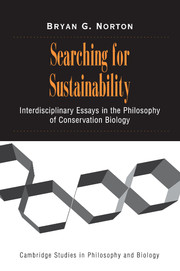Book contents
- Frontmatter
- Contents
- Searching for Sustainability
- General Introduction: An Interdisciplinary Experiment
- I PRAGMATISM AS AN ENVIRONMENTAL PHILOSOPHY
- 1 The Constancy of Leopold's Land Ethic
- 2 Thoreau and Leopold on Science and Values
- 3 Integration or Reduction: Two Approaches to Environmental Values
- 4 Convergence Corroborated: A Comment on Arne Naess on Wolf Policies
- 5 Pragmatism, Adaptive Management, and Sustainability
- II SCIENCE, POLICY, AND POLICY SCIENCE
- III ECONOMICS AND ENVIRONMENTAL SUSTAINABILITY
- IV SCALING SUSTAINABILITY: ECOLOGY AS IF HUMANS MATTERED
- V SOME ELEMENTS OF A PHILOSOPHY OF SUSTAINABLE LIVING
- VI VALUING SUSTAINABILITY: TOWARD A MORE COMPREHENSIVE APPROACH TO ENVIRONMENTAL EVALUATION
- Index
3 - Integration or Reduction: Two Approaches to Environmental Values
Published online by Cambridge University Press: 21 January 2010
- Frontmatter
- Contents
- Searching for Sustainability
- General Introduction: An Interdisciplinary Experiment
- I PRAGMATISM AS AN ENVIRONMENTAL PHILOSOPHY
- 1 The Constancy of Leopold's Land Ethic
- 2 Thoreau and Leopold on Science and Values
- 3 Integration or Reduction: Two Approaches to Environmental Values
- 4 Convergence Corroborated: A Comment on Arne Naess on Wolf Policies
- 5 Pragmatism, Adaptive Management, and Sustainability
- II SCIENCE, POLICY, AND POLICY SCIENCE
- III ECONOMICS AND ENVIRONMENTAL SUSTAINABILITY
- IV SCALING SUSTAINABILITY: ECOLOGY AS IF HUMANS MATTERED
- V SOME ELEMENTS OF A PHILOSOPHY OF SUSTAINABLE LIVING
- VI VALUING SUSTAINABILITY: TOWARD A MORE COMPREHENSIVE APPROACH TO ENVIRONMENTAL EVALUATION
- Index
Summary
INTRODUCTION: THE ROLE OF ENVIRONMENTAL ETHICISTS IN POLICY PROCESS
Environmental ethics has been dominated in its first twenty years by questions of axiology, as practitioners have mainly searched for a small set of coherent principles to guide environmental action. In axiological studies, a premium is placed on the systematization of moral intuitions, which is achieved when all moral judgments are shown to be derivable from a few central principles. The goal of these studies is to propose and defend a set of first principles that is (1) complete in the sense that this small set of principles can generate a single correct answer for every moral quandary and (2) jointly justifiable in the sense that, once the principles are warranted, then every particular moral directive derived from the principles must also be warranted.
The limiting case of axiological simplification is moral monism, the view that a single principle suffices to support a uniquely correct moral judgment in every situation. Monism represents to some philosophers an ideal because, provided the adopted principle is self-consistent, problems of coherence and consistency are resolved once and for all – there is no need to worry about what to do if two principles imply differing actions in a given situation, no worry that there will be irresoluble conflicts among competing and equally worthy moral claims. This reasoning motivates the drive towards unification.
- Type
- Chapter
- Information
- Searching for SustainabilityInterdisciplinary Essays in the Philosophy of Conservation Biology, pp. 47 - 77Publisher: Cambridge University PressPrint publication year: 2002



